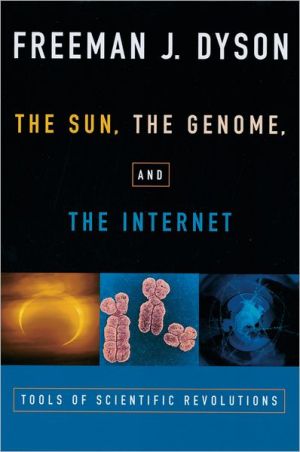

 |

|

The average rating for The Sun, the Genome, and the Internet: Tools of Scientific Revolutions based on 2 reviews is 4.5 stars.
Review # 1 was written on 2016-01-12 00:00:00 Christopher Faile Christopher FaileRating: "A/A+" -- another excellent essay collection by Dyson. The Sun, the Genome, and the Internet covers scientific revolutions, technology and social justice, and the exploration and colonization of space -- familiar Dyson topics all, and delivered with his usual grace. The three items in the title comprise Dyson's hope for generating wealth in the world's poor villages: the sun for cheap solar power, genetic engineering for better crop plants, and the Net to end rural isolation. For example, he presents the hope of engineering "trees that convert sunlight to liquid fuel and deliver the fuel directly... to underground pipelines." A neat solution to declining oil reserves, if it works. Dyson cheerfully admits his record as a prophet is mixed, but "it is better to be wrong than to be vague." Fresh and unexpected insights are a frequent pleasure in this and other Dyson books. For instance, he describes his mother and aunts -- prosperous British matrons all -- who, in the interval between the World Wars, accomplished such things as opening a birth-control clinic, managing a large hospital, winning an Olympic medal, and pioneering aviation in Africa -- "it was considered normal at the time for middle-class women to do something spectacular." They were able to do this only with the support of a large servant class. The introduction of labour-saving appliances helped to emancipate the servants, but left middle-class women less free than before, a general pattern, says Dyson: "the burdens of equalization fall disproportionately on women." Dyson is a lifelong space enthusiast, though things haven't gone that well lately for space fans: "we look at the bewildered cosmonauts struggling to survive in the Mir space station. Obviously they are not going anywhere except, if they are lucky, down." But in the long term, prospects are brighter, as we await the finding of a cheap way up and out of the gravity well (another enduring Dyson insight). He reports recent successful tests of a laser-launcher and a "ram accelerator," the latter a proposed 750-foot gas-gun -- and a direct descendant of Jules Verne's cannon-launched spacecraft in From the Earth to the Moon (1865). As in all cheap launch methods, the trick is to keep the fuel on the ground, not in the spacecraft. With cheap spaceflight, people will spread out into the solar system and beyond. Why? "Because it is there" -- some folks just have itchy feet. Others will belong to unpopular religions, or be on the run, or... any of the countless other things that have always motivated emigrants. Dyson, unusually for a theoretician, has always been more "tinker than thinker." He cites Thomas Kuhn's classic Structure of Scientific Revolutions (1962, revised edition 1970) as an example of a fellow-physicist with the opposite bent, emphasizing ideas over things. Of course, both are important; but some of Kuhn's followers put forward the idea that science is about power struggles, not new ideas. Dyson once upbraided Kuhn about this at a conference. Kuhn reacted angrily: "One thing you have to understand. I am not a Kuhnian!" Freeman Dyson is my favorite scientist-writer. I know of no one else who combines his clarity of thought, graceful use of language, big ideas expressed modestly, and sense of history. If you haven't yet read Dyson, The Sun, the Genome, and the Internet would be a fine place to start. [Review written in 1999, for SF Site] |
Review # 2 was written on 2010-07-20 00:00:00 Jan Vagts Jan VagtsI was surprised by this book. I thought it would just be all "wow, technology, cool." But it was actually about how to thoughtfully and ethically use technology to bring about social justice. Technology shouldn't just be about making new toys for the rich, but it should be about developing ways to level the playing field for everyone in the world. One thing I found that was very interesting was the accounts of how technological advances will often liberate one group of people while taking away the freedom of another group. One example given in the book was the rise of househould appliances in the early twentienth century. The servant class was done away with (in those days, middle class families might have multiple servants), but middle class women then lost much freedom when they had to return to household duties. Dr. Dyson, a physicist, sees solar energy, genetic engineering, and the Internet as the tools to bring about this social revolution. I would be interested in seeing an updated version of this book because this was written over ten years ago, and a lot has changed since then. Internet access still isn't freely available everywhere, but it sure is better than it was in the late 90's. |
CAN'T FIND WHAT YOU'RE LOOKING FOR? CLICK HERE!!!